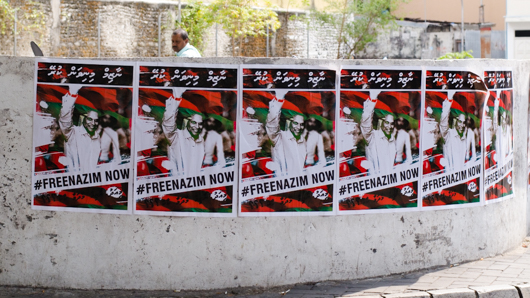The Criminal Court has pushed back the last hearing in former Defence Minister Mohamed Nazim’s illegal weapons charge to Thursday evening.
Defence lawyers today requested additional time to listen to recordings of witness testimony from previous hearings before they issued concluding statements.
The three-judge panel gave lawyers until 4:00pm on Thursday to prepare. Judges could deliver a verdict at their discretion afterwards.
Defence lawyers once again requested the three-judge panel to allow Nazim to leave the country, claiming doctors had said the retired colonel faced a potentially life-threatening condition, and had recommended he be flown abroad as soon as possible for medical tests that are not available in the Maldives.
But presiding Judge Abdul Bari Yoosuf contended the phrase ‘as soon as possible’ could be interpreted in various ways, and said the Criminal Court was working to expedite a verdict in the case.
Nazim was charged with illegal weapons possession after police discovered a pistol and three bullets at his home during a controversial midnight raid on January 18. He was subsequently dismissed from the cabinet, and arrested on February 10 on additional charges of terrorism and treason.
Nazim, in his defense, claims rogue police officers planted the weapons at his home on Tourism Minister Ahmed Adeeb’s orders after the pair fell out over Adeeb’s alleged use of SWAT officers for criminal activities, including the chopping down of all of Malé City’s areca palms in October last year.
Both Adeeb and the Maldives Police Services have dismissed the allegations.
In the last hearing on Monday, judges summoned only two of Nazim’s 37 defence witnesses.
Fabricated evidence?
State prosecutors also claim documents in a pen drive confiscated along with the weapons suggested Nazim was plotting a coup d’état and planning to harm President Abdulla Yameen, Commissioner of Police Hussein Waheed and the Tourism Minister.
Defence lawyer Maumoon Hameed once again claimed police officers had tampered with and fabricated evidence against Nazim, suggesting coup plans were in fact not even contained in the allegedly planted pen drive.
Hameed, who is also President Yameen’s nephew, said a forensic digital expert, Ameen Abdul Gayoom, in a closed hearing on March 19 said the pen drive had last been accessed in February 2014.
But the alleged plans to harm President Yameen – which were only revealed to judges and lawyers in the closed hearing – were supposedly to be carried out in November or December 2014, he said.
He went on to claim that the then-Assistant Commissioner of Police Hassan Habeeb had printed out the documents in the pen drive and questioned Nazim soon after the raid. He questioned how Habeeb had accessed the pen drive without resulting in the change of date of last access and noted Habeeb’s name was not listed on the pen drive’s chain of custody.
Habeeb was recently promoted to Deputy Commissioner of Police, and according to witness testimony in previous hearings, had commanded the raid on Nazim’s apartment.
State prosecutor Adam Arif denied that the forensic digital expert had made any comments on the date of last access, and said the chain of custody recorded the officers who had handled the physical pen drive, and not the electronic documents contained in it.
Hameed also noted several empty slots on the chain of custody record, saying the broken record suggested possible tampering.
Chain of custody is the record of all individuals who maintained unbroken control over the items of evidence, to establish proof that the items of evidence collected at the crime scene is the same evidence presented in a court of law.
Hameed also said there were gaps of between six and nine hours between when investigating officers had received the evidence and when they had handed evidence over to the forensic departments, arguing the delay amounted to officers flouting police regulations.
Further, while a Maldives National Defense Force (MNDF) officer had testified in a previous hearing to having fired the pistol to test if it was functioning, Hameed said the chain of custody record indicated the MNDF only had the weapons for just 15 minutes.
In response, Arif said the empty slots on chain of custody do not mean an unauthorised individual had handled the evidence, and said it did not affect the credibility of evidence presented at court.
Arif claimed the MNDF had possessed the evidence for over an hour, ample time to test the authenticity of the pistol and three bullets.
He also said the long delay in investigating officers handing over evidence to the forensics department did not necessarily mean officers had tampered with the evidence.
If convicted, Nazim faces a jail term between ten and 15 years.
The three judge panel overseeing Nazim’s case are the same judges who convicted former President Mohamed Nasheed on terrorism and sentenced him to 13 years in jail in a trial many observers have called a “travesty of justice.”

